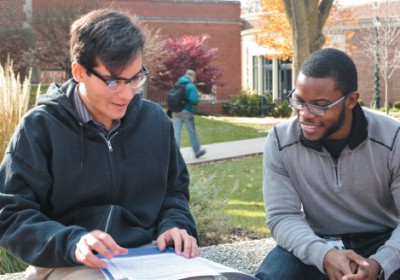New report highlights opportunities to strengthen regional workforce

Contact
Paul Duster
Director of Community Initiatives
563.588.2700
paul@dbqfoundation.org
For immediate release
With Dubuque’s unemployment rate around 2 percent, local employers struggle to find workers with the right qualifications to fill open positions. At the same time, the community’s poverty rate remains high, and at around 15 percent, the unemployment rate among people of color is significantly higher the overall rate.
That’s the challenge researchers from the Massachusetts Institute of Technology’s Sloan School of Management address in a new report that examines poverty and workforce development in the Dubuque region. The report is the culmination of a semester-long research project, during which three MBA candidates worked with the Community Foundation of Greater Dubuque to understand and address systemic factors that contribute to regional economic challenges for residents.
Through their research and a two-week visit to Dubuque in March, the researchers found that:
- Dubuque has an uncommonly robust network of social services and strong collaboration among organizations, yet the complexity of this network can be difficult for residents to navigate.
- Local employers are committed to improving diverse and inclusive workplaces, as evidenced by groups like the Community Foundation’s Business Leader Equity Cohort.
- Building a robust, diverse, and inclusive workforce involves requires work to help to lift up residents living in poverty and facing significant barriers to employment.
Now is an opportune time to take collective action to address these challenges, the report states: “With an increasingly diverse population and a new generation on the rise, both business and community leaders are doubling on their commitment to creating a more inclusive Dubuque.”
The Community Foundation is leading numerous initiatives to help move low-income, unemployed and under-represented members the Dubuque community into a pipeline focused on career-ladder jobs. Efforts like Opportunity Dubuque, Re-Engage Dubuque and the Dubuque College Access Network are focused on preparing high-school age students and adults who have not completed school for careers through higher education and job training programs.
In addition, Foundation-led workshops like Best Practices in Diversity, Equity and Inclusion and the Business Leader Equity Cohort are helping employers develop strategies for fostering welcoming and inclusive workplaces as well as attracting and retaining a diverse team of employees.
The MIT report will be an important point of reference for the Community Foundation and its partners in the business, civic, education and nonprofit sectors as they work together to address issues of employment, inclusivity and economic well-being.
“The Community Foundation is in a unique position to convene local leaders around regional needs and challenges and find solutions that improve the lives of our residents,” says Nancy Van Milligen, president and CEO of the Community Foundation. “This eye-opening report will help guide us that role and inform our efforts to refine existing programs and develop new approaches to our region’s workforce issues.”
The MIT study and partnership with the Community Foundation were part of a semester-long course in which the student-researchers and their peers actively worked to study and find solutions to economic, social and political conditions in communities across the country that pose barriers to opportunity for many Americans. Three students in the program focused on Dubuque, working closely with the Community Foundation to study the region’s economic landscape.
# # #
The Community Foundation of Greater Dubuque strengthens communities and inspires giving. For more information, visit dbqfoundation.org.